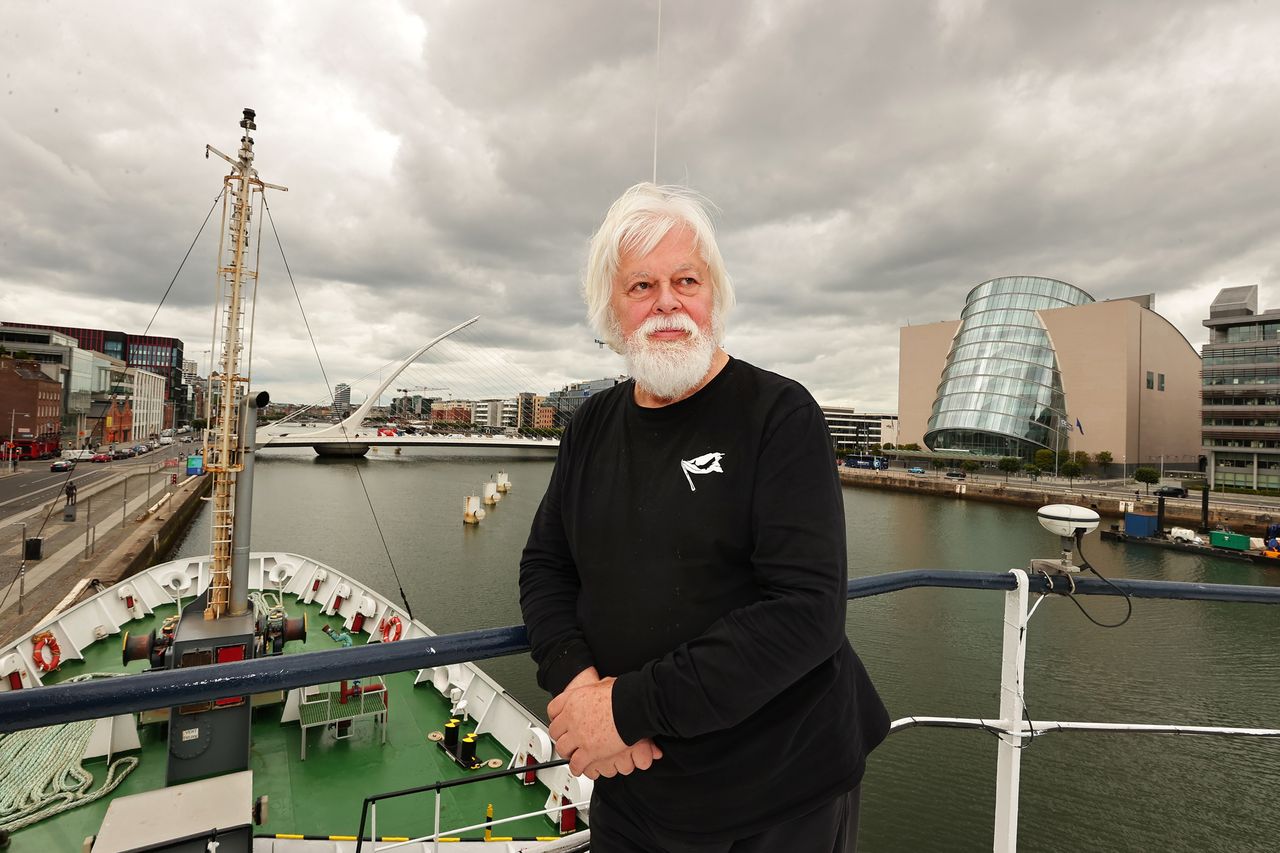October 10, 2024. (Cetacean Conservation Center, Ecoceanos Center) – Japan’s new Minister of Foreign Affairs, Takeshi Iwaya, stated that the request for extradition of American-Canadian environmentalist Paul Watson to Danish authorities “has nothing to do with whaling, and is a matter of law enforcement.”
On July 21, Watson was arrested by Danish police in Nuuk, Greenland’s capital, a territory under Danish control, after docking his ship, the John DeJoria, to refuel before continuing his journey to the North Pacific to intercept the Japanese factory ship Kangei Maru. Despite the global moratorium on commercial whaling, Japan continues to kill various species of large cetaceans in its jurisdictional waters after leaving the International Whaling Commission (IWC) in 2019.
As a sign of the advancement of the so-called harpoon diplomacy, the Japanese government announced before the 69th plenary meeting of the IWC — held from September 22 to 27 in Lima, Peru — that it included fin whales to the list of its commercial whaling operations. Fin whales are the second-largest species after the blue whale, and their population has not yet recovered from the impacts of industrial whaling. With this, Japan unilaterally adds this species to its whaling list of minke, Bryde, and sei whales in the North Pacific.
The founder of the Captain Paul Watson Foundation and former president of Sea Shepherd was detained in the capital of Greenland under a secretly issued arrest warrant by the Japanese government, accusing him of damaging their whaling vessel and injuring a crew member while opposing Japanese whaling operations in Antarctica in 2010.
According to Minister Iwaya, Japan is requesting Watson’s extradition from the Danish government as a matter of maritime law enforcement, rather than a whaling issue. However, Watson’s lawyers argue that Japan’s extradition request is based on false claims and affirm that they have video evidence to prove this.
Contradicting the assertion that the Danish justice system is one of the most exemplary in the world, the Nuuk court has refused to view the footage provided by the defense lawyers. Additionally, Watson, 73, remains in pre-trial detention under harsh conditions, which prevent him from receiving necessary medications for conditions such as hypertension and diabetes, while he is kept virtually isolated from his family. Lamya Essemlali, director of Sea Shepherd France, stated that Watson’s prison conditions have worsened, and “he is only allowed to speak with his wife for 10 minutes a week.”
Elsa Cabrera, executive director of the Cetacean Conservation Center, said, “Minister Iwaya’s statements are at least reckless. In 2014, the International Court of Justice, the highest judicial body on the planet, ruled that Japan’s whaling in the Southern Ocean was illegal, thus the actions of Sea Shepherd fall within what is known as application of environmental law and include measures taken by authorities, organizations, or in this case, individuals, to ensure compliance with environmental laws and regulations.”
Cabrera recalled that for more than thirty years, the Japanese government slaughtered tens of thousands of whales under the pretext of “scientific research” in the waters of the Southern Ocean and noted that this pristine area was declared a whale sanctuary in 1994. The falsehood of the “scientific'”research argument was evidenced by the historic ruling of the International Court of Justice, which stated that these killings were of a commercial nature. “Therefore, this case is not only about whaling but also about the serious violations of international environmental laws, such as the global moratorium on commercial whaling and the Southern Ocean whale sanctuary” Cabrera stated.
In mid-September, Watson’s lawyers contacted the UN Special Rapporteur on environmental defenders, expressing that he risked “being subjected to inhuman treatment in Japanese prisons.” In 2023 a Human Rights Watch report, indicated that Japan’s so-called hostage justice system denies criminal suspects due process and a fair trial, characterized by the deprivation of the right to remain silent, interrogations without lawyers, coercive confessions, and constant surveillance.
Juan Carlos Cárdenas, director of Ecoceanos Center, stated, “The goal of Japanese diplomacy is for its whaling fleet to resume operations in the biodiverse waters of the Pacific, Southern Ocean, and Antarctica, as part of its current political and military expansion agenda. Therefore, the elimination of the global moratorium on commercial whaling constitutes one of the tips of Japan’s geopolitical harpoons to pave the way in the waters of the Southern Hemisphere and Antarctica.”
Cárdenas added, “For this reason, Japan needs to set a cruel and abusive precedent — like sentencing Paul Watson — to intimidate environmental activists, human rights defenders, and environmental organizations seeking the end of commercial whaling and dolphin hunts in the world’s oceans.” He concluded that “what happens to Paul Watson will anticipate what could happen to defenders of biodiversity and the rights of local communities in our seas. Consequently, the forthcoming 2026 IWC meeting in Australia is viewed by mobilized citizens as a crucial opportunity to confront the entrenched barbarism and systemic abuses of the financial-industrial whaling complex that threaten our oceans.”



